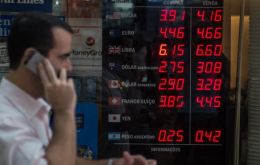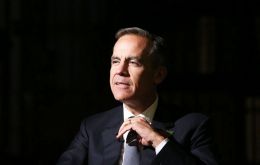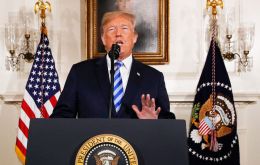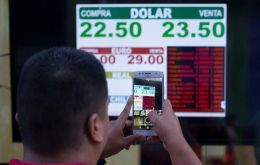MercoPress. South Atlantic News Agency
Tag: US dollar
-
Wednesday, August 29th 2018 - 08:33 UTC
Brazilian currency down on presidential election forecast jitters

The Brazilian Real led losses in Latin America as lingering concerns over presidential elections overshadowed a largely positive environment for emerging market assets. The US dollar ended trading at 4.333 Reales.
-
Friday, August 17th 2018 - 10:26 UTC
US/China announcement of trade talks come as a relief to world markets

The dollar stepped back from 13-1/2-month highs against other major currencies on Friday as talks next week between China and the United States offered some hope that the world’s two largest economies will find a way to head off a full-blown trade war.
-
Tuesday, June 26th 2018 - 08:22 UTC
Latam stocks and currencies hit by global trade disputes

Latin American stocks and currencies mostly fell on Monday as the trade dispute between the United States and other leading economies worsened, but central bank intervention kept the Brazilian real steady.
-
Thursday, May 24th 2018 - 08:44 UTC
Dollar/Peso challenge: Argentina offers to swap one-month Lebacs for long term papers

Argentina’s central bank moved on Wednesday to improve its debt profile by offering to swap some of its one-month Lebac securities for paper of longer duration, the bank said in a statement.
-
Friday, May 11th 2018 - 06:12 UTC
Bank of England leaves interest rates unchanged, slashes 2018 growth prospects

The Bank of England has backed off from raising interest rates as it slashed 2018 growth forecasts, but said the economy would bounce back from a weather-hit “soft patch”. Policymakers kept the prospect of rate hikes firmly on the cards, although it sparked confusion over when the next increase may come.
-
Wednesday, May 9th 2018 - 07:10 UTC
Latin American (and global) currencies hit by strong dollar and Trump's policies

The dollar hovered near a four-month high on Tuesday, continuing to draw support from higher Treasury yields and upbeat prospects for the U.S. economy, leaving its major rivals such as the Euro struggling and other Latin American currencies including the Argentine peso down sharply.
-
Monday, May 7th 2018 - 08:29 UTC
Argentina and China among the most vulnerable markets, says IIF

The markets of China, Ukraine, Argentina, South Africa and Turkey are the most vulnerable among all developing countries in terms of financing needs, reserve adequacy, asset valuation, institutional quality and trade resilience, according to a review by the analysts of the Institute of International Finance (IIF).
-
Friday, May 4th 2018 - 09:00 UTC
Argentine Peso tumbles 7.83% to US dollar; central bank raises rate to 33.25%

Argentina’s central bank raised its benchmark interest rate by 300 basis points to 33.25% percent on Thursday, but the second steep rate increase in less than a week failed to stop the country’s peso currency from swooning to a record low. The local currency tumbled 7.83% to 23 per U.S. dollar. It had hit 21.2 to the greenback on Wednesday, the first trading day due to a holiday after the bank hiked the rate to 30.25% from 27.25% on Friday.
-
Monday, April 2nd 2018 - 08:50 UTC
China preparing to begin paying for imported oil with the Yuan

China is taking its first steps towards paying for imported crude oil in Yuan instead of the U.S. dollar, according to Reuters, a key development in Beijing's efforts to establish its currency internationally.
-
Thursday, January 25th 2018 - 10:03 UTC
Treasury Secretary tells Davos US welcomes a weakening dollar

The U.S. dollar extended its recent rout to hit three-year lows on Wednesday after U.S. Treasury Secretary Steven Mnuchin said he welcomed a weakening in the dollar. Fears of protectionist trade policies by the United States had already pushed the greenback to a three-year low, and Mnuchin’s remark at the annual Davos summit of business and political leaders pushed it down further.
